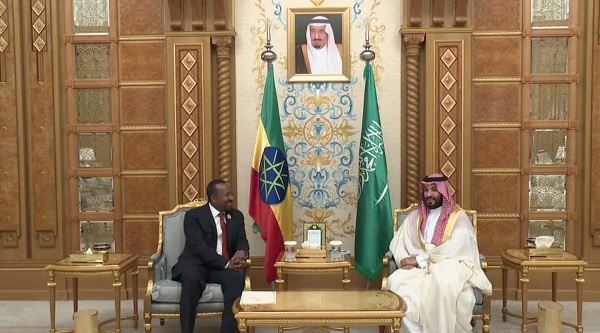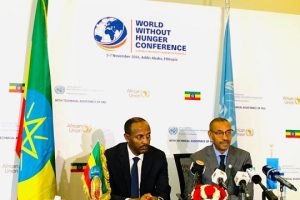
Months ago, Ethiopia rolled on the yellow and green painted carpet adorned by Enkutatash or adey abeba a seasonal flower that blossoms in the September month of Ethiopia. Prime Minister Abiy Ahemd, flanked by flower girls, has greeted UAE President Mohamed Bin Zayid at Bole International Airport.
The scenic and warm welcome speaks volume about the growing friendship between Ethiopia and Gulf nations, with the latter finding itself in the doorsteps and highly engaged in the socioeconomic as well as political affairs of the Horn of Africa. While Ethiopia’s geographic proximity and significant influence in Africa make the nation a major partner of the oil-rich nations, the relation has witnessed a boost in recent years. Unlike previous times, Arab nations have been taking bold steps to bolster their involvement in global matters as they also vie to assert their influence in the Horn of Africa as well.
Over the years, Ethiopia’s all-rounded ties with the Gulf nations have been going through a rosier period, with the latter stepping up its presence and engagement in the Horn of Africa.
Turbocharged by petrodollars and influential leaders, Gulf nations have positioned themselves to be an emerging actor in an increasingly multipolar world. And, being an anchor state in the strategic yet volatile region of the Horn of Africa, Ethiopia remains to be at the first rung in the ladder of Gulf countries’ foreign policy. The last five years have only seen bilateral cooperation gain a boost as Ethiopia tries to navigate through the opportunities created by the rivalry of alliances being formed in the region.
It is to be recalled that Prime Minister Abiy Ahmed’s personal comradery with the leaders of Gulf nations, particularly the UAE and Saudi Arabia, and his country’s importance to the peace and tran quillity of the Horn made it a staunch ally and a decisive partner for the desert garden nations.
The nations, besides funnelling much-needed forex through credit and loans to back the early days of Abiy Ahmed’s leadership when he took over the premiership of the cashs trapped economy, both kingdoms have also provided relief and humanitarian assistance in Ethiopia. In the last couple of years, there have only been highlevel visits between the nations. And, last week, Abiy arrived in Riyadh, Saudi Arabia, to take part in the inaugural Saudi-Africa Summit, another testimony to a partnership witnessing a new height. The summit showcases the big appetite of the Gulf countries to push for cemented ties with African nations.
Abiy and his delegation demonstrated the growing cooperation between the two nations. 1948 marked the start of diplomatic ties between the two nations when Saudi Arabia became one of the first Arab nations to open an embassy in Addis Ababa, reported Ethiopian News Agency. Regarding this, Prime Minister Abiy and Crown Prince Mohammed bin Salman of Saudi Arabia discussed strategies to strengthen the two nations’ diverse alliances and partnerships after the summit. These strategies were anticipated to center on bolstering cooperative efforts, improving political synchronization, and tackling threats to regional security. It is well known that
the two nations work closely together in a variety of fields, including trade and investment. Ethiopia is the country that imports the most oil from Saudi Arabia and exports the most cereals. Saudi Arabia employs a large number of Ethiopians, ranging from highly skilled to low-level human resources. Beyond Saudi Arabia Relationships between Ethiopia and the Gulf nations are occasionally improving in areas of multilateral collaboration. The nation has a multi-cooperation agreement, particularly with regards to its connections with Qatar, the United Arab Emirates, and Saudi Arabia.
The country’s economic (trade and investment) relations with Gulf countries have shown significant progress in the last two decades.
The oil-rich countries have strong economic power and vast potential for foreign direct investment (FDI). These countries are working to minimize their oil dependence by diversifying their economies. Ethiopia, on the other hand, has offered investment opportunities in agriculture, manufacturing, and service sectors for the countries that are compatible with the latter’s goals of diversifying their economies, according to a study published in 2021.
Further, providing investment opportunities Ethiopia is the second most populous country in Africa. So, this creates the opportunity for high market destinations and human power for the Gulf countries. The recent boloster relations between the UAE and Ethiopia from the two sides reassure how the countries relations are deepening in various sectors. The UAE president Sheikh Mohammed bin Zayed Al Nahyan’s visit to Ethiopia strengthened not only the two countries relations but also sent a message about how Ethiopia’s and Gulf countries relations have increased. The president’s visits also strengthen long-standing ties between the two countries. The UAE is also another provider of oil products for Ethiopia and participates in
Ethiopia’s development efforts as well as humanitarian service. The UAE is one of the key trading partners of Ethiopia, and the trade exchange has witnessed steady growth in the past few years.
The Ministry of Trade disclosed that the volume of trade exchange between the two countries amounted to six billion USD.
State Minister Ambassador Mesganu Arga’s report from last year indicates that the non-oil trade volume between the two countries reached USD 1.4 billion in 2022. The Ethio-UAE nonoil trade has surged by 180 percent over the last 10 years. Besides, about 130 UAE companies are active in Ethiopia, working in various sectors of investment. Out of these companies, most of them are huge companies with international reputations. UAE companies are active in the fields of real estate, trade, aviation, renewable energy, agriculture, mining, logistics and infrastructure, health, education, environment, and technology.
Also, one of the biggest economy owners and Gulf countries’ Qatar has exemplary relations with Ethiopia and has deepened their relationship, especially in recent years.
Recently, State Minister Ambassador Mesganu Arga received the Deputy Head of Mission of the State of Qatar to Ethiopia, Jaber Jemal Al-Awami, at his office. Highlighting the strong political and economic cooperation between
Ethiopia and Qatar, Ambassador Mesganu stressed the need to capitalize on the existing potential for investment and development cooperation between the countries. Jaber Jemal Al-Awami, on his part, stated that Qatar attaches great importance to its wide-ranging relations with Ethiopia. With the high consumption of oil in Ethiopia and food from the Gulf, the two sides are interdependently tying their relations together for mutual benefit.
Ethiopia’s comfortable climate and land resources for agriculture attract the Gulf countries’ detachment from their only oil production. Ethiopia’s rapidly growing economy and population are also important factors in the two regions’ growing relationship. Beyond economic and political relations, the two sides’ religious history is the basis for their robust relation.
The era of unipolar world has been over, new world order is fledgling, blocs like BRICS, South South and others have been presenting themselves as an alternatives of international cooperation and this opens a window of opportunities for countries like Ethiopia in terms of financial source and political partnership. In fact for African nations, there should not be Eastern or Western blocs, as developing nations, African nations should make use of every penny available and help coming from either sides.
BY EYUEL KIFLU
THE ETHIOPIAN HERALD TUESDAY 14 NOVEMBER 2023




